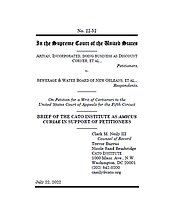Ariyan sued in federal district court to enforce the judgment. The district court held that Louisiana state law bars federal courts from compelling the Sewerage Board to pay the compensation Ariyan is due. The Fifth Circuit recently upheld this erroneous judgment. Indeed, according to the Fifth Circuit, the Sewerage Board could withhold constitutionally required compensation for decades, if they ever pay at all, and federal courts would be powerless to do anything about it. But the Fifth Amendment’s guarantees cannot be contingent upon the government’s grace, and the Fifth Circuit’s judgment conflicts with the Supreme Court’s own interpretation of what the Fifth Amendment requires.
Cato has filed an amicus brief urging the Supreme Court to take up Ariyan’s case to reestablish that property owners can sue in federal court to compel state or local governments to pay what they owe. As we explain in the brief, the Just Compensation Clause of the Fifth Amendment requires reasonably timely payment and judicial enforcement in the case of nonpayment. Without a judicially enforced temporal limit on when just compensation is due, lower courts will continue to permit indefinite delays. For many elderly property owners, like the property owners in this case, indefinite delay may be functionally equivalent to denial of just compensation entirely.
When landowners suffer deprivation of their property, as Ariyan did here, they need just compensation promptly so that they can relocate, rebuild, or repair the damage. Ariyan’s property damage included damaged foundations, shifting porches, broken floors, cracked walls, leaking roofs, and inoperable and leaky doors and windows. An unenforceable state court judgment is no substitute for compensation for these severe government-inflicted damages to their homes and businesses.
Government stonewalling to delay or outright refuse payment is a recurring problem, and sadly, poor and disadvantaged communities are the ones most likely to have property seized. After the Fifth Circuit’s ruling, these communities will also be more likely to go uncompensated after the government seizes their property.
The Fifth Circuit’s decision shows that federal courts are confused about what the Just Compensation Clause requires, confusion which is now undermining a core Fifth Amendment guarantee for Louisianans. We urge the Court to grant review to clarify that just compensation under the Fifth Amendment requires reasonable promptness of payment and enforceability.




